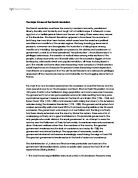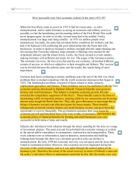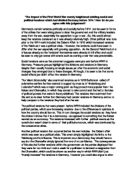Why did Mussolini come to Power in 1922? How did Mussolini consolidate his position by 1926?
History L6 HL Written by: Igor Knezevic Why did Mussolini come to Power in 1922? How did Mussolini consolidate his position by 1926? After the unification of Italy in 1870 the country was run by a series of liberal governments. The period between 1870 and 1922 was an era that faced major problems- poverty, unemployment, a lack of national identity and perhaps most significantly of all, the First World War. The Liberal government were extremely ineffective in solving these problems, which caused unrest within the population. There was also a severe lack of unity within the government and a lot of internal political conflict. However, the Liberal government were not only ineffective, they were unpopular. For example, the government attempted to solve the problem of the lack of natural resources and military strength by forming a triple alliance with Germany and Austria-Hungary, who were traditionally Italy's greatest enemy, and the people resented this. This gave rise to unrest among the people, leading to the development of socialism, despite attempts to ban it. All the above points served only to aid Mussolini in his rise to power and the government's weaknesses provided a platform on which his popularity could grow and as editor of a socialist newspaper he was able to influence people's opinions a great deal. The single most
Was it the policies pursued by Henry VIII that caused "the mid-Tudor crisis"?
Was it the policies pursued by Henry VIII that caused "the mid-Tudor crisis"? "The mid-Tudor crisis" is a term often used by historians to describe the reigns of Edward VI (1547-1553) and Mary I (1553-1558). This period can be seen as a crisis, due to the fact that there were so many problems, financial, social, religious and constitutional, all of which led to rebellions, and placed the country in a very unstable position. It is clear that many of the origins of this 'crisis' have their roots in the reign of Henry VIII, especially in his final years, and therefore to an extent his policies were responsible for the 'mid-Tudor crisis'. He left a very difficult legacy to his successors, but it must be remembered that Somerset exacerbated the problems already in existence and Northumberland and Mary then had the difficult task of resolving them. Henry VIII on his own can not be held entirely responsible for the crisis, he was only one contributing factor. There were many underlying social and economic problems which his policies did not cause. Henry's policies relating to the constitutional difficulties can not be held to blame for the crisis. Indeed, during his reign, Cromwell's reforms had actually made the Tudor state more powerful, but "this advantage was weakened by a minority". Before he died in 1547, Henry had attempted to prevent a power struggle by setting up a
Contrast The Contribution Made By Mazzini, Cavour and Garibaldi to Italian Unification
Contrast The Contribution Made By Mazzini, Cavour The unification of Italy was a complicated process that started from the 1790s and lasted until the conquest of Rome by the Italian troops in 1871. The Napoleonic Era, however, did not forecast such an outcome of things: at the beginning of the XIX century Italy consisted of separate states that were ruled first by the French, then by the Austrians who did not think about the unity. The 1820s and 1830s signalized the urging need of Italy to change – people missed the partial freedom that Napoleon gave them and wanted to participate in governing, which was impossible as long as Austria held so much influence within the peninsula. The revolutions of 1820-1 (Piedmont) and 1831-2 (Papal States) showed the citizens that a change is possible. The revolution of 1848 and 1849 gave more hope to the Italian patriots all over the country, for they saw that Milan was able to hold back Austria for some time and for Piedmont was beginning to gain the position of a leader within the States. The shrewd policies of the Piedmontese government and the significant conquests at the South of the Peninsula led to the creation of The Kingdom of Italy in 1861 and then connection of Rome and Venetia. Three people clearly played a great role in the process of unifying the State: Giuseppe Mazzini, the ideological leader of the Italian patriots and
Assess the view that Stalins suspicions of his western allies between 1941 and 1945 were justified
Assess the view that Stalin's suspicions of his western allies between 1941 and 1945 were justified Throughout the Second World War, there were many disagreements and causes for suspicion between the USSR and its allies in the west in the period 1941-1945. The four factors that will be investigated in this coursework, which are the Second Front, Poland, The Grand Alliance and the atomic bomb, were all issues that strained relations between these allies and caused suspicion between the two. Historian Bradley Lightbody argues that the Soviet Union expected their Western allies delayed the Second Front in the hope that the Soviet and Nazi armies would destroy each other. This would lead Stalin to be suspicious of his western allies as it appears that if what Lightbody argues were to be correct, then this would help the west in eliminating there pre-war threats in Communism with Stalin, and Fascism with Hitler. In his writing, Lightbody says, "800,000 Soviet soldiers and civilians were killed in the single battle of Stalingrad, compared to 375,000 British and 405,000 American casualties for the entire Second World War."1 This evidence is useful in justifying Stalin's suspicions of the west as it appears that Lighbody's view is true. However, after evaluating all the fighting that took place in the Second World War, it is clear that actually, Britain and America were not as
Major Causes of French Revolution
The Major Causes of the French Revolution The French revolution overthrew the country's ancient monarchy, proclaimed Liberty, Equality and Fraternity and fought off a hostile Europe. It ushered in a new age, but at a terrible price in blood and human suffering. There were many causes of the Revolution. The French Revolution appears to have been the outcome of both long term and short term factors, which arose from the social and political conditions and conflicts of the ancien regime. The long standing grievances of peasants, townsmen and bourgeoisie; the frustration's of rising hopes among wealthy and 'middling' bourgeoisie and peasants; the distress and breakdown of government; a real (or at least perceived) 'feudal reaction'; the stubbornness of a privileged aristocracy; the creation of radical ideas among wide sections of the people; a sharp economic and financial crisis; and the successive triggers of state bankruptcy, aristocratic revolt and popular revolution: all these factors played a part. The middle and lower class were becoming more conscious of their increased social importance and because the peasants were becoming more independent, more literate and prosperous that the old feudal freedoms and aristocratic privileges appeared all the more burdensome and intolerable for the struggling discontents of France. For more than one hundred years before the accession
How successful were Nazi economic policies in the years 1933-45?
How successful were Nazi economic policies in the years 1933-45? When the Nazi Party came to power in 1933 it had two main aims - to solve unemployment, and to make Germany as strong an economic and military power as possible, so that the humiliating and devastating defeat of the First World War could never happen again. In order to do this, several areas had to be tackled. Firstly, unemployment was huge and rising steadily - in 1933 six million people were unemployed. Secondly, the party had promised better conditions for workers, and this had to be balanced with continuing the good relationship that the Nazis had with businesses. In order to build up Germany's military strength after the under-funding and downsizing that Versailles imposed, large amounts of funding were needed for the armaments industry and the armed forces. Lastly, the Nazis wanted to create autarky - making Germany self-sufficient and ready for war. The stages of the German economy - The economic recovery, the four year plan and the war economy, all reached different extents of success, to which are subjective to their strengths and failures. The 'success' can be divided between the policies aims, and the results, the results being of most importance. Germany had faced continuing economic problems since the end of the first war, those problems then worsened coinciding with the world economic depression
Mussolini's foreign policy.
Mussolini's foreign policy. Foreign and military policy were the key activities of the Fascist state. Martin Clarke. Such was Mussolini's belief in the importance of foreign policy that apart form a brief period from 1922 to 1936 he acted as his own Foreign Minister and thereafter retained control his son-in-law Count Galeazzo Ciano. Mussolini's style abroad, as at home, was that of the bully rather than the negotiator and here too he firmly believed that in politics it was more advantageous to be feared rather than liked. In foreign policy he challenged other countries one after the other to create the impression of being a difficult person who had to be bought off with victories of prestige. Running about biting everybody was how the South African leader, Smuts, described him at the end of 1923. While he told foreigners that his policy was one of peace a co-operation, at the same time he told Italians that his aim was national grandeur. During its first year of rule, Fascism gave the world the opportunity to judge its ideas on world policy, not only by official declarations but by actual proof. On the 27th of August 1923 an opportunity fell to Mussolini to show that Italian foreign policy was powerful and dynamic. An Italian general and four members of his staff were shot while working on frontier arrangements between Greece and Albania for the League of Nations. Two days
How far do you agree that Hitler became Chancellor primarily due to political intrigue?
How far do you agree that Hitler became Chancellor primarily due to political intrigue? The Nazi party was the largest political party in the Reichstag after the July 1932 elections; their influence and foothold in Germany could not go unnoticed. Hitler was an excellent public speaker who was able to influence those he wanted to, and Nazi party member Goebbels was running a massive propaganda campaign to increase Hitler's popularity further. But, August-December 1932 was a difficult period for the Hitler's Nazi party - more radical members were becoming restless as although their party was popular throughout Germany and Hitler looked certain to be the next Chancellor, they did not have the majority vote yet and legally there was no clear path into the German government, especially as the current president did not trust him. At the time, Germany was led by President Hindenburg. The President was elderly and relied on his aides and colleagues, Chancellor Von Papen and General Schleicher, to guide him in difficult political decisions. Von Papen was unpopular in Germany and in September 1932 he lost a vote of no confidence in the Reichstag, by a massive 512 votes to 42. His response was to dissolve the Reichstag and call for yet another election. The German public was fast becoming tired of the constant elections & the restlessness of the electorate combined with the dwindling
Lenin's Legacy Has Been Grossly Exaggerated; to what extent do you agree with the statement?
"Lenin's Legacy Has Been Grossly Exaggerated" Lenin's Legacy Has Been Grossly Exaggerated; to what extent do you agree with the statement? What is Lenin's legacy? A legacy is defined as: "The gift that an individual leaves, both in the details of their will and in the tradition of giving they shared with their descendents." Therefore Lenin's legacy is what he gave to the people after his death. Could it be a up and coming communist state? Or could it be a release from the class system with a new way of thinking? One of the leading political figures and revolutionary thinkers of the 20th century, Lenin masterminded the Bolshevik take-over of power in Russia in 1917 and was the architect and first head of the Soviet state. He posthumously gave name to the Marxist-Leninist ideology, but by the death of the communist system in 1991, his legacy was largely discredited. Vladimir Ilich Ulyanov grew up in a good educated family in provincial Russia. He excelled at school and went on to study law. At university, he was exposed to radical thinking, and the execution of his older brother, a member of a revolutionary group also influenced his views. He was expelled from university for his radical policies. Lenin completed his law degree as a student in 1891. He moved to St Petersburg and became a professional revolutionary for the peasants. Like many of his predecessors, Lenin was
The main reason why the German revolutions of 1848 failed was because they failed to win popular support How far do you agree?
"The main reason why the German revolutions of 1848 failed was because they failed to win popular support" How far do you agree? The German revolutions of 1848 had two main goals, to unify a German nation state and moderate liberalisation and demands for political reform. The revolutions failed to unify Germany due to the weaknesses of the revolutions itself (lack of support, leadership, money, etc.), the failure of the Frankfurt parliament and the strength of the forces of continuity and forces of reaction. The main reason for failure of the revolutions came from the weakness of the revolutions itself as they failed to grasp what they needed to succeed and lost too many opportunities. Popular enthusiasm for revolution is often short lived and within a few months the desire of nationalism and liberalism dyed down. The support needed amongst peasants for a revolution to occur was not in hand, the leaders of the revolutions failed to gain mass support with the lower classes and the peasants needed a leader to control them. They were causing disturbances in the countryside by refusing to perform feudal services and attacking castles but they did not want the same as the middle class and did not understand there ideologies and aims. The loss of support was encouraged by the slow progress of the Frankfurt parliament. The Industrial code that was put forward was hope for the























